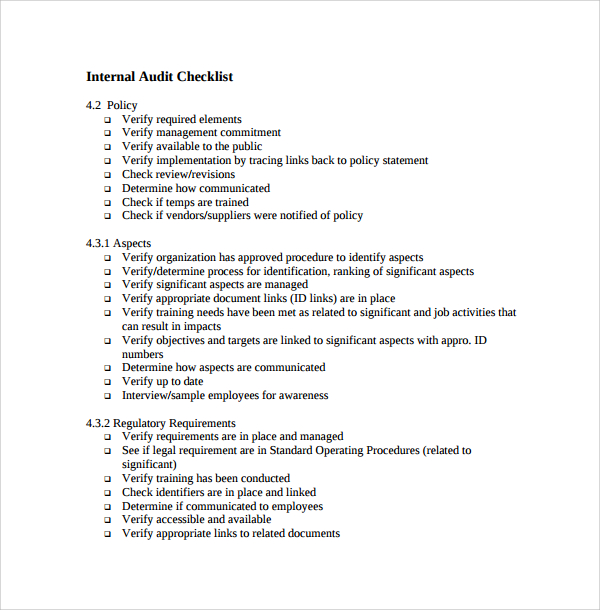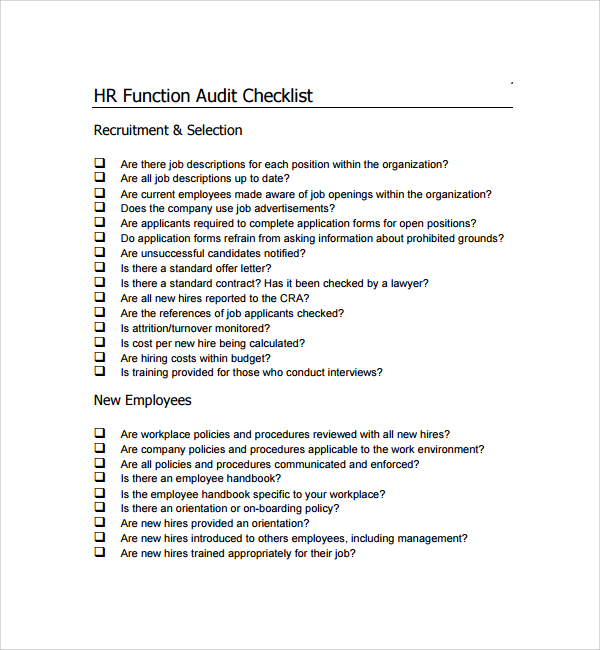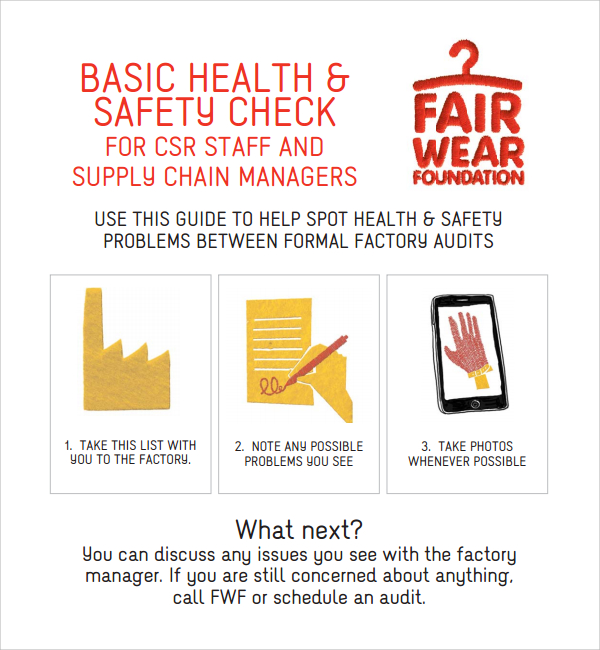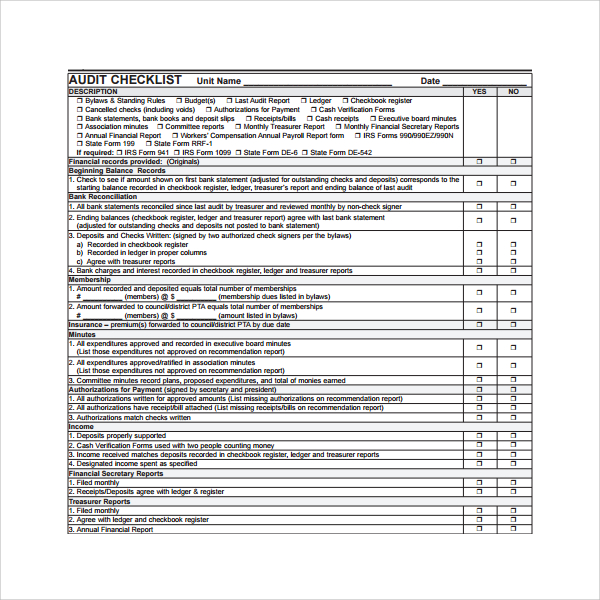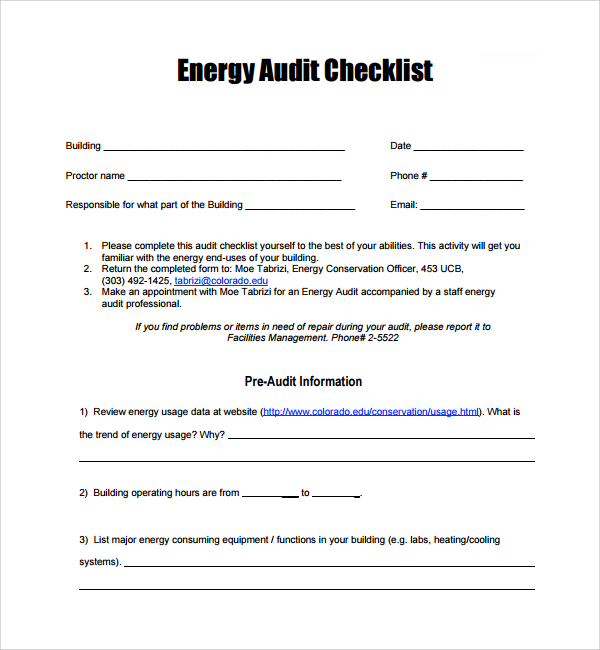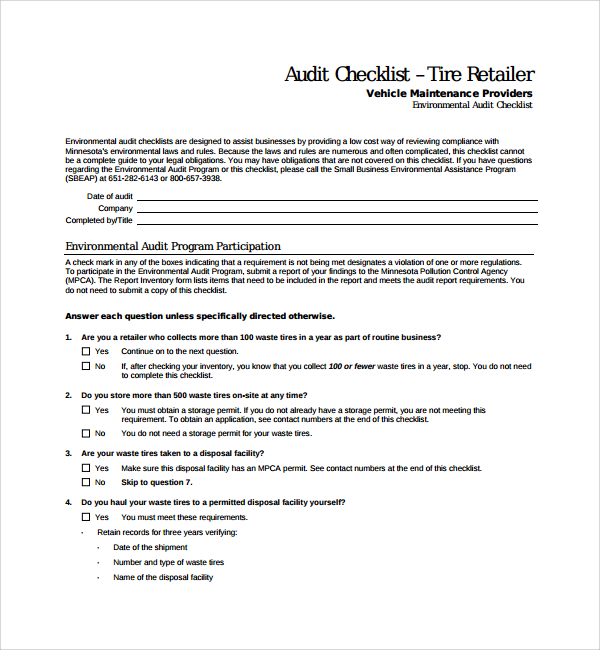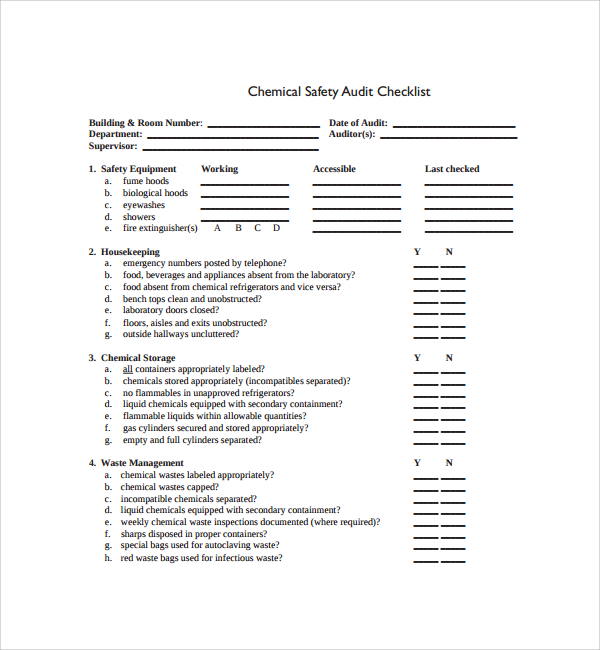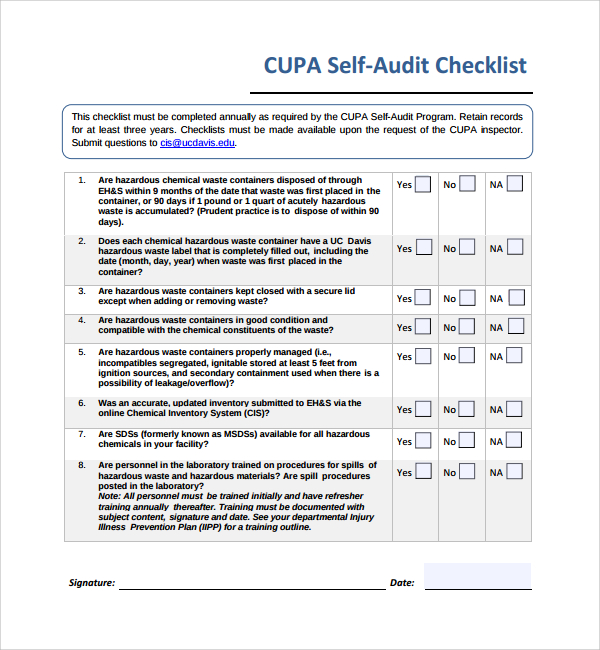Businesses conduct internal auditing and inventory checking to avoid miscalculations and inaccuracies. While this process provides essential information for the company, entrepreneurs should still seek assistance from independent consultants for verification and realignment. Hence, enterprises undergo two levels of auditing to ensure reliability, honesty, and competence. Now, these reviewers utilize audit checklists to make the task easier. Gather more details about this checklist template by reading this article.
FREE 18+ Audit Checklist Templates
1. Sample Audit Checklist
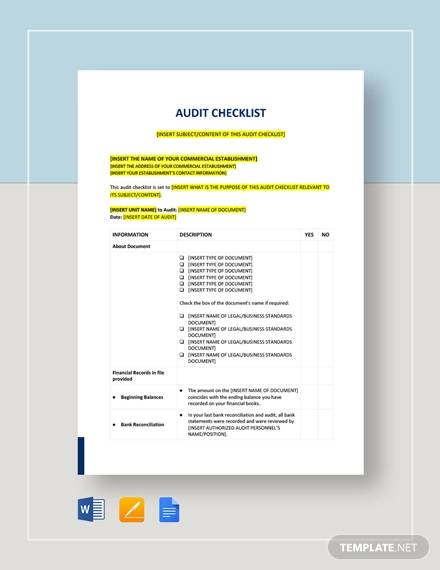
2. Management Audit Checklist Sample
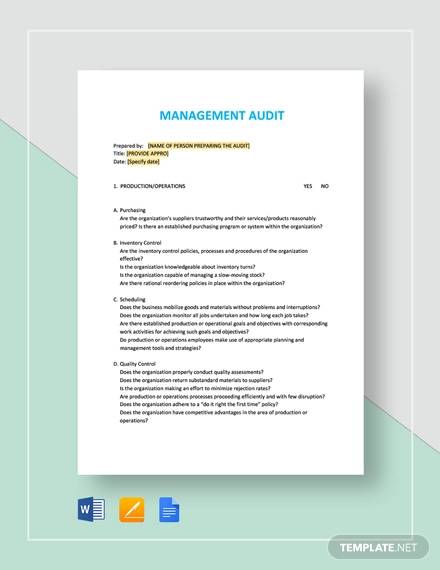
3. Environmental Compliance Audit Checklist Template
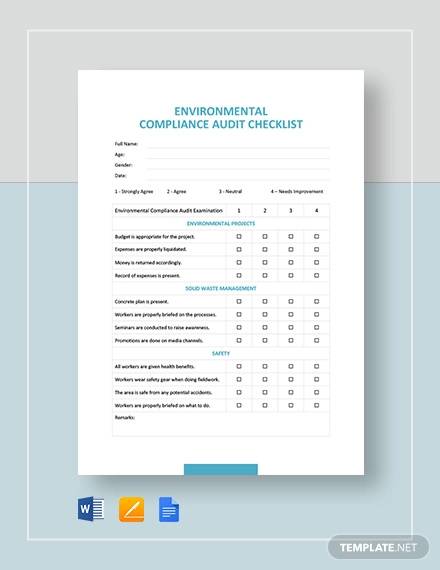
4. Compliance Audit Checklist Template
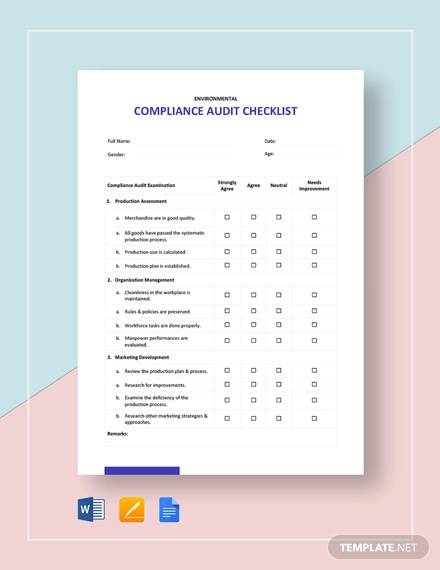
5. Safety Audit Checklist Template
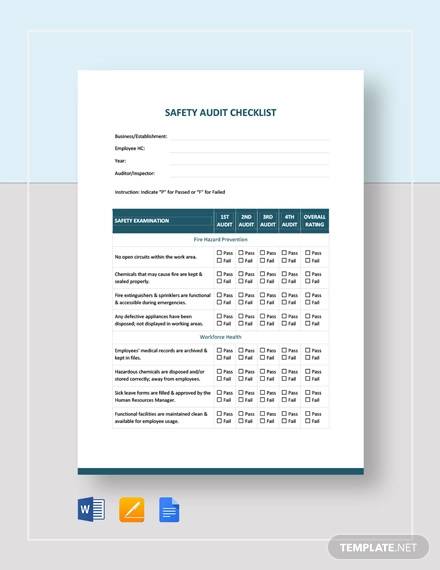
6. Restaurant Audit Checklist Sample
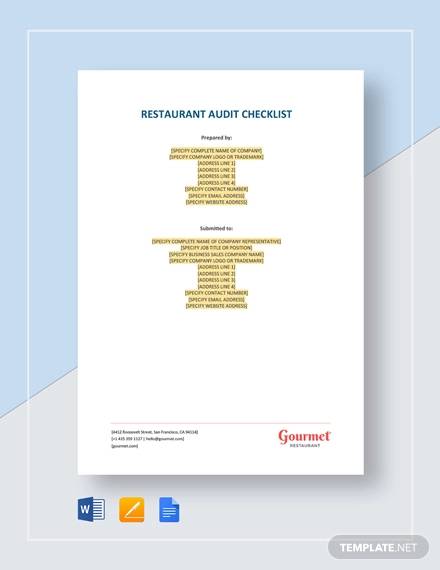
7. Compensation and Benefits Audit Checklist Sample
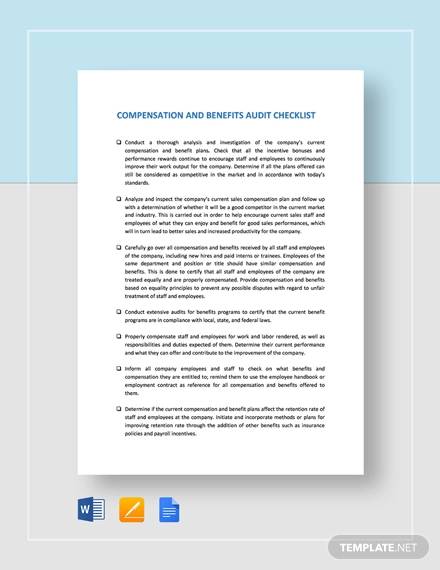
8. Audit Checklist Template
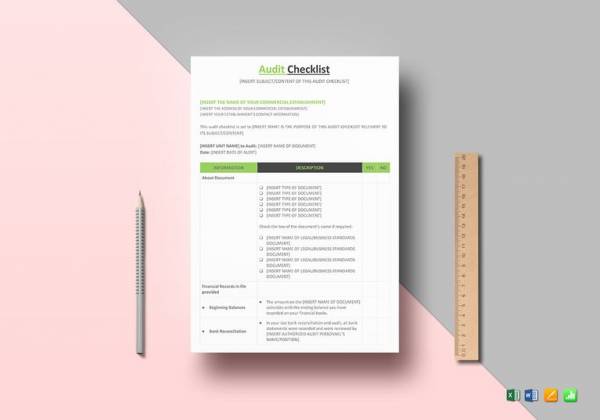
9. Management Audit Checklist Template
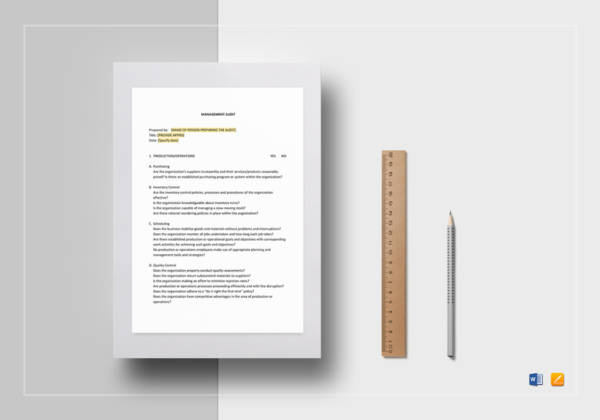
10. Compensation and Benefits Audit Checklist Template
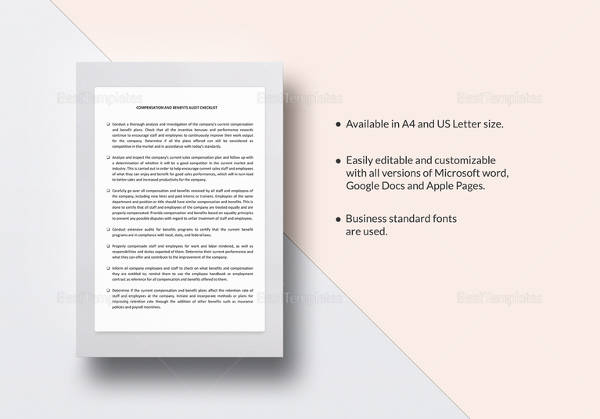
11. Internal Audit Checklist Template
12. Safety Audit Checklist Template
13. HR Audit Checklist Template
14. Health and Safety Audit Checklist
15. Audit Checklist Template
16. Energy Audit Checklist Template
17. Simple Audit Checklist Template
18. Chemical Safety Audit Checklist
19. Free Audit Checklist Template
What Is an Audit Checklist?
In a simple explanation, an audit checklist serves as one of the instruments used by internal or external auditors for the business inspection process. Using the checklist, the professionals can organize the procedures for examining or inspecting the company’s financial statements, manufacturing process, and administrative system. In most cases, a corporation hires an independent expert to conduct the audit for verification purposes.
According to the recent reports from the U.S. Bureau of Labor Statistics’ Occupational Outlook Handbook, the number of accountants and auditors in 2018 was more than 1.4 million. On average, the worker spends more than 40 hours per week in the office. In a forecast from Statista, an increase in the figures of auditors and accountants will happen over the coming years. As most industries demand professional services from these professionals, more people are encouraged to be bookkeepers or analysts.
How To Construct a Formal Audit Checklist
Making the internal audit checklist for a manufacturing company can take time and energy. Aside from the financial audit, supplier audit, and inventory audit, there are other things to consider when assessing an enterprise’s various departments and procedures. Hence, you have audit checklists to manage the system in a better fashion. Here are the steps in making the formal checklist.
1. Establish the Department, Activity, or Area for Auditing
In constructing the checklist, you first have to establish auditing objectives and guidelines. Here, you determine the specifications on where to start the audit of goods, services, or plans. Do you focus on budget marketing plans for the business or the funding for employee training plans?
2. Determine Parameters for Checking
After establishing the concentration of the audit checklist, set the parameters or mechanisms for validating information. For instance, the company’s financial records are derived from invoice reports and cash flow statements. So, the auditor needs to check these documents for accuracy.
3. Separate Financial, Operational, and Managerial Auditing
Auditing is more than the monetary aspect of the organization. At times, it also includes other departments, such as the administrative offices and operation division. With that, you have to separate the checklists for the different parts of the business.
4. Add Spaces for Note Taking
And lastly, make sure you provide sufficient space for note-taking. The users of the checklist can utilize this area to jot down missing information or inaccurate details. In cases where the numbers do not match the written file, it can be noted in the material.
FAQ’s
What is an internal audit checklist for operations?
In business, an internal audit focuses on the affairs or situations happening within the company. For operations, the internal audit checklist assesses compliance reports and preventive maintenance plans. Here, the auditors conduct quality audits and safety audits to guarantee the well being of workers and the products manufactured by the firm.
When will I use the health and safety audit template?
After creating the health and safety plan for the organization, you also need an audit template. The sample audit form concentrates on the safety assessment reports submitted by the planners. It also includes incident management plans in case of emergencies in the workplace. On the other hand, construction projects also use construction audit templates and site audit checklists to determine punch lists and overlooked safety hazards.
Should the human resources department have payroll audit checklists?
Yes, the HR department should include a payroll audit in their HR operational plan. With this tool, the office can trace the salary system and lessen discrepancies. Additionally, the HR manager can easily track the records of each employee in the establishment.
The importance of auditing goes beyond its capacity to determine the financial and operational status of the firm. In a way, the audit report evaluates how the company functions in different processes. From here, the business can establish better business plans and practices. Whether it’s for facility audit or retail store audit, having the right tool makes a difference. With the audit checklist, the employed independent auditors and the company personnel can finish the task comfortably.
Related Posts
FREE 9+ Blank Bill of Lading Samples in PDF
FREE 7+ Commentary Writing Samples and Templates in PDF
FREE 9+ Sample Hazard Analysis Templates in PDF
FREE 10+ Corporate Bylaws Samples in PDF | MS Word
FREE 10+ Business Debt Schedule Samples in PDF | MS Word
FREE 10+ Sample Consent Agreement Templates in PDF | MS Word
FREE 10+ Sample Copyright Agreement Templates in PDF | MS Word
FREE 10+ Sample Residential Contract Templates in PDF | MS Word
FREE 13+ Distributed Ledger Samples in PDF | DOC
FREE 9+ Workplace Investigation Samples in PDF | DOC
FREE 8+ Sales Plan and Sales Strategy Samples in PDF | MS Word
FREE 8+ Business Estimates in XLSX | PDF
FREE 10+ Distribution Network Samples in PDF | DOC
FREE 10+ Horizontal Integration Samples in PDF | DOC
FREE 10+ Disposable Income Samples in PDF | DOC

